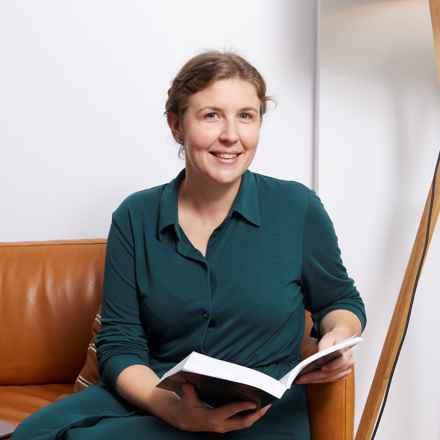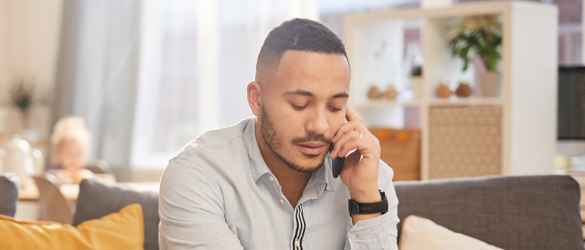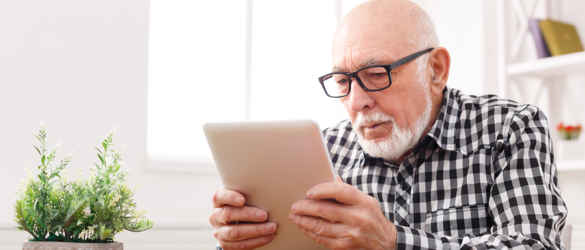'Talking about it is an opportunity to help people understand more about sight loss'
Posted: Thursday 29 February 2024
Leah's journey with Best disease started when she was growing up with her brother Finn, who has the condition. But, even though she knew what it was, her own eyesight was not affected.
Ten years ago, that all changed.
While working in London, she experienced persistent headaches from long hours at the computer, which prompted her to get an eye test. Although the optician detected an issue and referred her for further tests, Leah never received any results. Despite this, she brushed it off, assuming everything was fine.
But things changed again in 2021. Leah said: “I was working on an animation for a client. I created this female cartoon character, and I thought she had stubble because her chin looked all fuzzy. And I kept staring at this female cartoon character and thinking, ‘oh, God, I've given her a beard. What am I doing?’
“Eventually I realised it was my eyesight.”
Memories of her eye test all those years ago came flooding back, so she put in a request for her medical records. When they arrived by post, Leah, who was 33 at the time, was shocked by what she saw.
"I'd been diagnosed with Best disease. They just hadn't told me.”
Talking about the impact of this news, the 36 year old, said: “I was aware of the condition because of Finn, but it genuinely hadn't occurred to me that I might have it too. I understood from his diagnosis that it affected people in their teens. So we all, as a family, assumed that if your eyesight was fine as a kid, then there was nothing to worry about. So it really knocked me for six.
“I felt very frustrated and angry, really, that that diagnosis had been made and had never actually been communicated to me.”
Receiving the news while the UK was in lockdown, due to the Coronavirus pandemic, added to Leah’s concern.
But, an internet search pointed the business owner to the Macular Society where she found an online community of people who understood what she was going through.
Leah took part in the Society’s employment therapy group, and through these sessions found herself coming to terms with her condition by talking to others affected by this rare macular condition.
She said: “People talked about some really difficult experiences, but there was something very reassuring about talking to other people who were having a similar thought processes to me.
“We all had different conditions, we all had different situations, but I heard someone else voice an emotion that I had been experiencing, that feeling that someone else is in the same boat as you.
“You think, is it just me? Am I the only one who worries about this or that, do people see me as a fraud or do they think I'm exaggerating this condition? Actually hearing other people tell stories that were similar to me, there was something sort of strangely comforting about that.”
She added: “There were people in later stages with more significant sight loss but it was helpful, even a bit scary in some ways, to hear them talk about their sight loss experience; things that were helpful for them, things that they'd been able to put in place to make their lives easier or to keep them in work. I think it's useful to have things like that on your radar, so if things get worse for me, then I have an idea of what I can do.”
Leah is an online learning course designer alongside her brother Finn. The pair have dealt with their conditions differently, but Leah has found it encouraging to speak openly with others.
She said: “Finn and I are like any small business owners – we talk every week and we run through all the aspects of running a company: projects, deadlines, finances, opportunities. We don’t talk about Best disease very often, but I know that if I want to talk to him about it, I absolutely can. We’re very open and honest with each other. When I was first diagnosed, I wanted to talk about it more and I had questions for him, but now I think I’m more used to it.
I regularly post on LinkedIn about Best disease and sight loss, as accessibility is a key part of what we do, and I find that sharing my personal experiences can be a good way to begin those conversations with clients or partners.
Living with Best disease has enabled Leah to fly the flag for sight loss and accessibility in the world of business.
In 2024, she was recognised in the #ialso100 list, which celebrates female entrepreneurs from across the UK. This has given her a platform to shout about the work she does, as well as adapting to life with Best disease.
She said: “I think running your own business, especially when you're working from home, mostly it can feel a bit isolating and you end up in your own bubble. You're working to this deadline or that one, you’re juggling projects with your head down missing the outside world, so it’s lovely for someone to come along and say you’re doing really great work and we want to celebrate that.
“I do see that as an opportunity to talk about sight loss and to try and raise awareness of that and talk about accessibility. It’s a really diverse list too, which is wonderful. Small Business Britain are doing a lot of work around inclusion and supporting disabled entrepreneurs and diverse entrepreneurs so it’s nice to be a part of that.”
Leah shared her story with the Macular Society as part of Rare Disease Day 2024.
Rarer condition-specific support groups
From Best disease to PIC, the Macular Society has created a number of online condition-specific groups to offer peer support and information. The groups meet online once a month.
Free counselling and emotional support for sight loss
Are you dealing with the emotional challenges of macular disease? Our telephone counselling service is for anyone who has been diagnosed with macular disease or their family members. Use our free service today.
Online condition-specific groups
Join an online community of people with the same type of macular disease as you, share experiences and learn something new.




